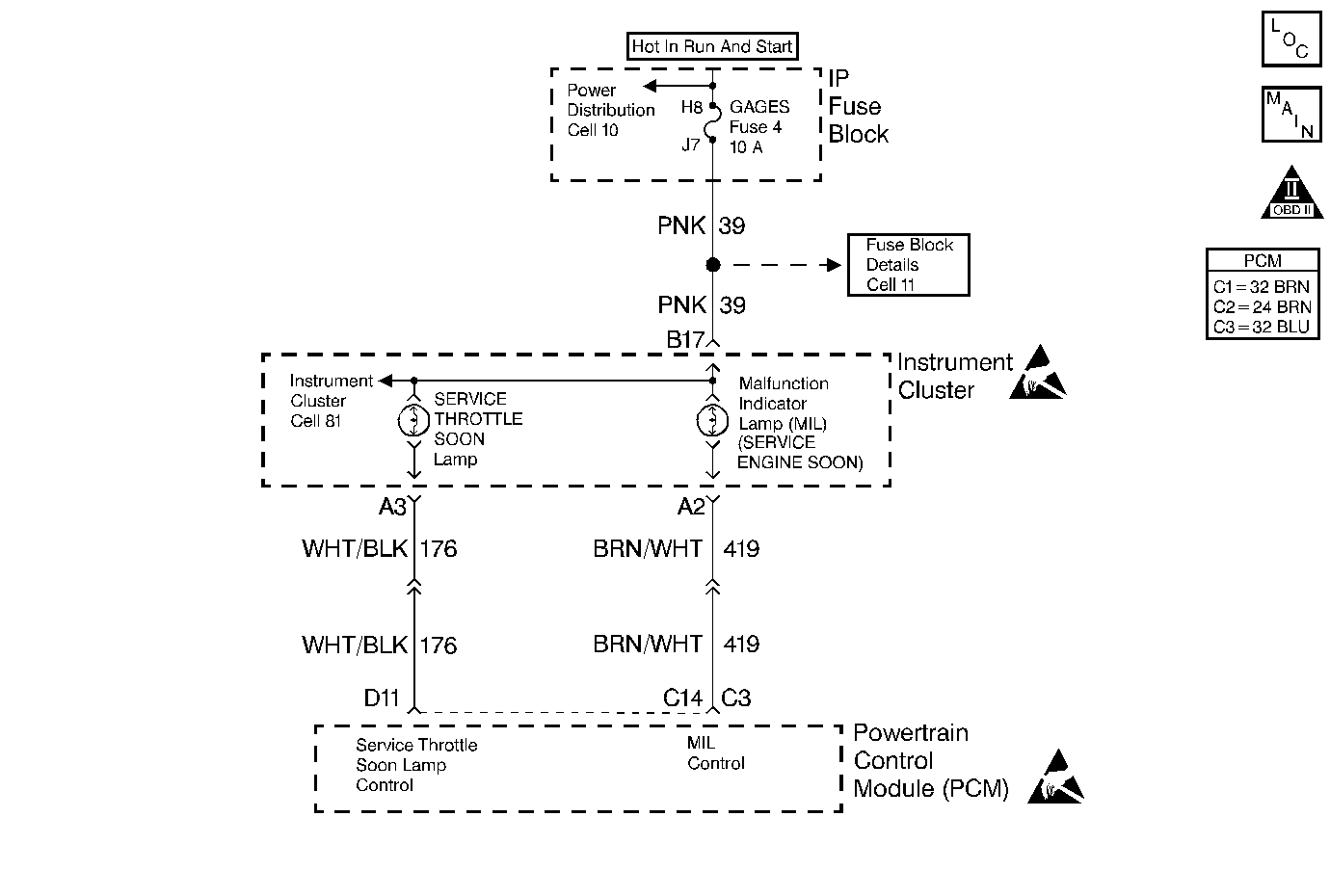
Circuit Description
A dash light is illuminated by the PCM if the diagnostics have detected certain errors related to the engine performance or the engine sensor status. When the PCM is commanding the MIL ON, the voltage potential of the circuit will be low (near 0 volts). When the PCM is commanding the MIL OFF, the voltage potential of the circuit will be high (near the battery volts). The primary function of the PCM is to supply the ground for the MIL circuit.
Conditions for Setting the DTC
| • | The MIL is requested ON. |
| • | The voltage on the MIL control circuit is high (near the battery volts). |
or
| • | The MIL is requested OFF. |
| • | The voltage on the MIL control circuit is low (near 0 volts). |
Action Taken When the DTC Sets
| • | The PCM will not illuminate the Malfunction Indicator Lamp (MIL). |
| • | The PCM records the operating conditions at the time the diagnostic fails. This information stores in the Failure Records. |
Conditions for Clearing the MIL/DTC
| • | A History DTC will clear after forty consecutive warm-up cycles during which the diagnostic does not fail (the coolant temperature has risen 5°C (40°F) from the start up coolant temperature and the engine coolant temperature exceeds 71°C (160°F) during that same ignition cycle). |
| • | Use of a Scan tool will clear the DTC codes. |
Diagnostic Aids
A malfunctioning bulb, the control circuit shorted to ground or battery voltage, will cause a P1641 to set.
An intermittent may be caused by the following:
| • | Poor connections |
| • | Rubbed through wire insulation |
| • | Broken wire inside the insulation |
Test Description
The number(s) below refer to the Step number(s) on the Diagnostic Table.
-
Be sure that both the ON and the OFF states are commanded. Repeat the commands as many times as necessary.
-
If no trouble is found in the control circuit or in the connection at the PCM, this could be an indication that the PCM is malfunctioning; however, this is an extremely unlikely failure.
Step | Action | Value(s) | Yes | No | ||||||
|---|---|---|---|---|---|---|---|---|---|---|
1 |
Important: Before clearing any DTCs, use the Scan Tool Capture Info to save freeze frame and failure records for reference, as the Scan Tool loses data when using the Clear Info function. Was the Powertrain On-Board Diagnostic (OBD) System Check performed? | -- | ||||||||
Does the lamp turn ON and OFF with each command? | -- | |||||||||
3 | The DTC is intermittent. If no additional DTCs are stored, refer to Diagnostic Aids. If any additional DTCs were stored, refer to those table(s). Are there any additional DTCs stored? | -- | Go to the applicable DTC table | Go to Diagnostic Aids | ||||||
4 |
Is the lamp OFF? | -- | ||||||||
5 |
Is the lamp ON? | -- | ||||||||
6 |
Was a repair performed? | -- | ||||||||
7 | The MIL control circuit is shorted to ground. Repair as necessary. Is the action complete? | -- | -- | |||||||
8 | Check the MIL circuit for the following:
Is the repair complete? | -- | -- | |||||||
Is the action complete? | -- | -- | ||||||||
10 |
Does the Scan Tool indicate the diagnostic Passed? | -- | ||||||||
11 | Does the Scan Tool display any additional undiagnosed DTCs? | -- | Go the Applicable DTC Table | System OK |
